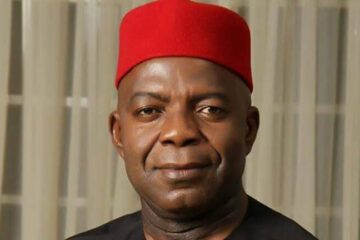
The Federal Government on Monday announced its ambitious goal to position Nigeria at the forefront of Africa’s innovation revolution.
During a high-level summit focused on Research, Development, and Innovation (RDI) held in Abuja, the Minister of Innovation, Science, and Technology, Chief Uche Nnaji, emphasized the government’s strategy to enhance the country’s global competitiveness through technological advancement and sustainable development.
He outlined a three-point plan to revolutionize Nigeria’s RDI ecosystem: strengthening institutional frameworks, fostering public-private partnerships, and investing in human capital.
According to the Minister, the Federal Government envisions an inclusive, forward-thinking system that synergizes academia, industry, government, and community efforts.
He insisted that the Federal Government’s focus on innovation is clear, emphasizing that through concerted efforts and strategic partnerships, Nigeria aims to propel itself to the top in Africa.
“Our vision for Nigeria is to become a hub for African innovation, contributing significantly to the global knowledge economy.
“We aim to bring all the research we have on our shelves to light and develop them. This is the central focus of my role as Minister. This is our primary objective,” Nnaji stated, emphasizing the need to harness the country’s research for practical development.
Nnaji stressed that the theme, ‘Advancing Nigeria’s Global Competitiveness Through a Resilient National RDI Coordination,’ is more than just words but a clarion call to action.
“The journey to enhancing Nigeria’s global competitiveness through resilient RDI coordination is a collective endeavour. It requires commitment, collaboration, and a relentless pursuit of excellence,” he added.
Echoing the Minister’s sentiments, Dr. Udodirim Ugonna, representing the Director-General of the Raw Materials Research and Development Council, Prof. Hussaini Ibrahim, pointed out the critical role of innovation in development.
He emphasized the need for a collaborative approach to harness and consolidate research for policymaking and industrial development.
“We have been making efforts to add value to locally available raw materials in the country.
“I believe this programme will harness the multitude of innovations across the country and make them available for policymaking and economic advancement,” Dr. Ugonna said.
Prof. Abubakar Sani, the President-elect of the Nigerian Academy of Science, also highlighted the importance of integrating research outputs into the annual programs of Ministries, Departments, and Agencies (MDAs).
He cited the underutilization of research and the need for outputs to be tailored for immediate adoption.
Adding a global perspective, Dr. Shabihul Hassan of the International Agriculture Consulting Group shared insights from his 50 years in Nigeria, underscoring the significance of international collaboration in sectors such as agriculture and power.
He cited India’s success story in grain production and exports as an example of what Nigeria could achieve through cooperation.
Omo Oaiya, Chief Strategy Officer at WACREN, together with Dr. Mustapha Ayo Popoola, Executive Director of RIKE-SD, pointed out the challenges faced by Nigeria’s RDI sector, including a lack of coordination and fragmented efforts.
They called for a unified approach to transform the national RDI narrative and unlock over N10 trillion in knowledge assets.
The summit, organized by WACREN through its LIBSENSE initiative and supported by the UK Foreign Commonwealth & Development Office (FCDO), emphasized the importance of stakeholders’ commitment to shaping a brighter future for Nigeria.



